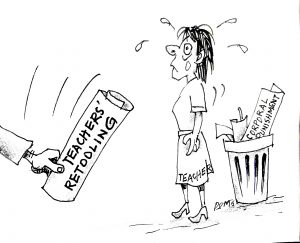In light of the prohibition of physical punishment in disciplining unruly children, elementary and high school teachers must undergo comprehensive retraining and retooling to effectively manage classroom dynamics and address behavioral issues. With the removal of corporal punishment as a disciplinary tool, teachers are tasked with finding alternative methods to maintain order while implementing a positive learning environment.
Retraining these teachers should prioritize the development of effective classroom management skills. Teachers need to relearn how to create a structured and supportive learning environment where students feel safe, respected, and engaged. Techniques such as establishing clear expectations, implementing consistent routines, and utilizing positive reinforcement can help prevent behavioral problems from escalating and promote a conducive atmosphere for learning.
Teachers must be equipped with the knowledge and strategies to handle violent and abusive behavior among students. This includes recognizing early signs of aggression, de-escalation techniques, and appropriate interventions to ensure the safety and well-being of both students and staff. By receiving specialized training in conflict resolution and behavior management, teachers can effectively address challenging situations while maintaining a calm and composed demeanor.
This retooling of teachers should involve education on trauma-informed practices and understanding the underlying factors contributing to disruptive behaviors. Many children exhibit challenging behaviors as a result of adverse experiences or unmet needs, and teachers must be equipped to respond with empathy and sensitivity. Training programs should emphasize the importance of building positive relationships with students, fostering a sense of belonging, and providing appropriate support and resources for those in need.
Ongoing professional development opportunities should be provided to ensure that teachers stay abreast of best practices and evidence-based strategies in classroom management and behavior intervention. Collaboration with psychologists, counselors, and other support communities can also enhance teachers’ ability to address complex behavioral issues effectively. Through continuous training and support for teachers, schools can create a nurturing environment where all students can thrive academically and socially.
The prohibition of physical punishment in schools is already in place, and it underscores the need for teachers to undergo retraining and retooling in classroom management and behavior intervention. We just need to equip teachers with the necessary skills, knowledge, and support so that schools can promote positive discipline practices and create safe and supportive learning environments for all students. Investing in teacher training is essential to ensure the well-being and success of both students and educators in today’s educational landscape.




